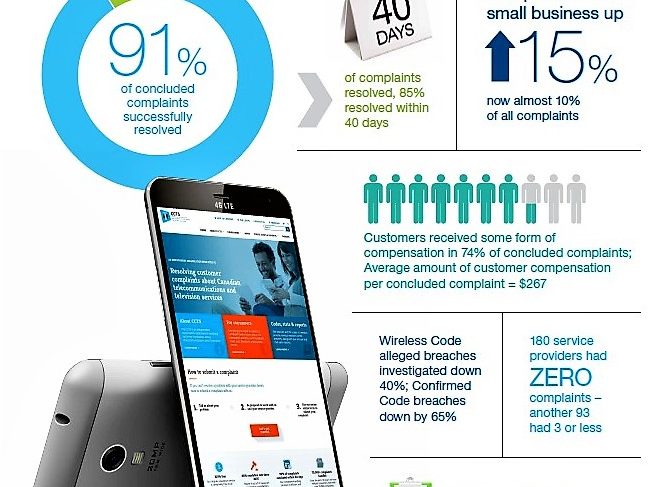
Internet complaints on the rise; PIAC wants a new code of conduct
OTTAWA – The Commission for Complaints for Telecom-television Services (CCTS) said today it saw an 11% increase in the number of complaints received from Canadian telecom customers in 2016-17, a turnaround of a three-year trend of declining complaints.
While Canadians continue to complain most often about their wireless services, they represent a declining proportion of all complaints to the CCTS, says the organization in its press release. What’s on the rise, however, are consumer complaints about their broadband services.
“The CCTS is the administrator of the CRTC’s Wireless Code, and reports a substantial decrease in the number of breaches of the Code by wireless service providers. Nonetheless, customer complaints continue to raise allegations of Code violations, particularly about unilateral changes made to their contracts, the application of data overage caps, and the failure to provide notice before disconnection,” reads the release.
Internet service is the subject of 31% of the complaints made by Canadians in 2016-17, but those have been climbing for seven years, says the report. “The pattern of increasing complaints about internet is cause for concern”, said CCTS Commissioner Howard Maker in the release.
Despite the increase in complaints, the CCTS reports that 91% of complaints were successfully resolved to the satisfaction of the customer and the service provider. However, complaints from small businesses rose 15% year over year.
Consumer group Public Interest Advocacy Centre says the annual report points to the need for additional oversight – that there needs to be a Internet code of conduct (just like the ones for wireless and TV) and a review of the sales practices of Canadian carriers.
“It is clear from the continuing increases in Internet complaints that the CRTC should create an ‘Internet Service Code’ to regulate internet service providers,” said John Lawford, PIAC’s executive director and general counsel, in a press release. “Internet service looks like wireless prior to the Wireless Code: many complaints about changing contract terms, overcharging and early cancellation fees.
“People get misled during negotiations on the phone or online with a communications salesperson,” added Lawford, “Recent news stories have highlighted this problem and here’s the proof. We call on the CRTC to inquire into sales practices across all telecom and television services, as this level of complaints about disinformation is unacceptable and unfair to consumers.”
A couple of the carriers responded to the report’s release. Said Telus’ official response: “While we have seen a small increase in complaints year over year, Telus continues to have the fewest complaints of any national carrier, a position we have maintained for the last six years through a relentless focus on putting our customers first. However, we know we still have work to do, and that to improve, we need to continue to listen carefully to our customers. We welcome this kind of feedback, and will continue to learn from the CCTS report and its findings. Our commitment to making customers our top priority will not change, and we’re embracing new ideas that will make the Telus experience better, every day.”
A Rogers spokesperson added: “Improving our customers’ experience is a key priority for us. Over the past five years, our CCTS complaints have gone down over 70%, but this is an ongoing effort and we have more work to do.”


